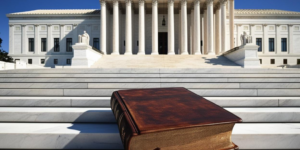Why This Popular Megachurch Pastor Almost Gave Up His Ministry
He may lead one of the largest Assemblies of God churches in the country, but John Lindell still remembers when he failed the test of faith. Lying on the floor of his tiny office, staring up at the ceiling, he breathed out one final prayer of desperation. It was January 1991, and Lindell was neck-deep in a disastrous church-planting tenure in Overland Park, Kansas, with only eight people attending after 18 months. Five of them were his own family members.
“God, I came here,” Lindell prayed. “Now I’m financially ruined and ministerially ruined.”
For years, Lindell believed that all it took to grow a church was faith and hard work. If you just work hard, do the right things and preach the Word, he told himself, you can build a church.
Lindell didn’t believe that anymore. He had reached his breaking point.
“God, I quit,” he said. “And just so you know I’m serious, I’m calling the district superintendent. I’m going to tell him too.”
Lindell called up the Assemblies of God district superintendent and explained he needed to abandon Calvary Community Church, the church he had founded. For months, the denomination had partially funded the church, and Lindell admitted they were wasting their money keeping Calvary open (“I’m sorry for taking [that money] out of a good church,” he said). The superintendent graciously accepted Lindell’s resignation.
That day, Lindell told God, “I don’t think even You can build the local church here.”
The very next Sunday, a new family came to Calvary Community Church. The Sunday after that, another new family joined the church. Next, Lindell’s next-door neighbors got saved. Then his neighbors across the street got saved. The church’s weekly Bible study grew so large it outgrew its space twice. Over 100 people attended Sunday services. Today, Abundant Life Church—as Calvary was later renamed—still serves the Overland Park community as a viable, healthy church.
But it was too late for Lindell. He had already resigned and packed his bags—physically and emotionally. He felt like a failure—and worse, he knew he had failed God’s test of faith. He told his wife that unless he got a new pastoral job soon, he would go back to law school—his original career path before God called him to ministry.
So Lindell was surprised to receive an invitation to interview for the pastoral role at James River Church in Springfield, Missouri. In fact, based on Lindell’s account of his interviews, it sounds like he spent most of his time explaining why he shouldn’t be hired.
“If you’re looking for a guy who’s got a big burning vision for Springfield, or you need somebody who’s going to put the jumper cables on the car and start it up—a fiery kind of person—I’m not that guy,” Lindell told the church council. “I’ll work hard, but I’m tired. My wife’s tired. We’re a little bit burnt out.”
The next morning, Lindell went out to breakfast at Steak ‘n Shake with one of the council members.
“Listen, I think you’re making a mistake,” Lindell told him. “I feel like a failure, and I think I’ll hurt the church. I just don’t want to hurt what you’ve got going on here.”
The council member considered Lindell’s words, then replied, “John, I don’t think you’re a failure. I think you can be good for us. And we can be good for you. I hope you’ll come.”
“The power of a statement of encouragement changed the course of [my] life,” Lindell says. “Because on that one statement, I said, ‘OK, I’ll come.’ I look back on that, and I think, Man, a breakfast at Steak ‘n Shake directed the course of my life. I came to James River, and it’s been an incredible ride.”
Today John and Debbie Lindell serve as co-lead pastors of a church of thousands, with four campuses across southwest Missouri. James River Church is one of the largest Assemblies of God churches in the United States. The church has spawned countless church plants, charities and conferences. In 2010, Outreach magazine listed James River as one of the fastest-growing churches in America. And Lindell knows none of that is because of him.
“People can look at James River and think, ‘Oh wow, this guy was a big visionary and had a lot [of success],'” Lindell says. “Vision plays a big part, and I understand that, but the bigger story at James River is that God sometimes sovereignly for His own will and good pleasure does things that defy human qualification or human quantification—He just wants to do something to show Himself powerful. … He’s the one who builds the church. And I think God honestly had to burn that into my heart to prepare me for what was next at James River. Because I’m under no illusions that I can go, show up in another city and have another James River happen.”
For Lindell, James River Church has been his second chance at the test of faith. As a result, he’s passionate about sharing the grace of God with anyone who will hear it. And grace is the subject of his new book, Soul Set Free (Charisma House).
“I felt like I failed the test of faith in Kansas City because I got to a place where I didn’t believe God could build the church,” Lindell says. “It really speaks of God’s willingness to bless us beyond what we can imagine and to let people who have failed the testing phase experience His work, as He gives people a second chance,” Lindell says. “Because He’s the God of the second, third, fourth, fifth, sixth, seventh, eighth, ninth, tenth chance.”
Amazing Grace
In Soul Set Free, Lindell dives deep into the book of Romans to understand the truth of grace. The book mirrors Lindell’s own sermon style, highly exegetical and Bible-driven. When Lindell first came to James River Church, the council questioned whether churchgoers would accept exegesis. But Lindell says God has always drawn him to preaching straight from the Bible.
“When you take people through the Word of God over time, you’re teaching them to study the Bible,” Lindell says. “You’re spending way more time getting ready to preach than you are thinking about what to preach. Because, honestly, I know next time I get up to bat, I’m going to be preaching from Romans 13:1, because that’s where I left off. … It forces the preacher to preach on topics he wouldn’t normally preach. It gives people a more balanced diet. And I think it teaches them how to study the Word of God, [which] develops a depth in the congregation that I think few things will. I’m not saying James River is the deepest church there’s ever been, but you can see a depth in the people that come just because they’ve heard significant theology presented and have had to wade through it and process it. I think that has a real strengthening effect on their lives.”
Romans was actually one of the first books Lindell preached through when he came to James River.
“I did it in 16 weeks, which isn’t what I would call a profound look at the book,” Lindell says. “As I grew in understanding, in the Lord and in my ability to research, I thought, ‘Man, I need to do Romans over, because when I did the first time, it was certainly not adequate.'”
What he discovered rocked his world. Though he was comfortable discussing grace, Lindell realized the truth hadn’t sunk into his spirit—he was still living from a works-based approach to righteousness.
“I’m a disciplined guy, so in order to feel good about my walk with God, I’ve got to do certain things,” Lindell says. “I’ve got to read my Bible, and so I read my Bible. I read the Bible through every year, and I have since I was 20 years old. … But it’s like ‘If reading it through once a year is good, then probably reading it through twice is going to be even better.’ Maybe three times will be even more. Because when you’re motivated by works righteousness, it’s never enough. You’re never going to do enough. You pray an hour? Well, you could have prayed two hours. Did you fast for a week? You could have fasted two.”
He thinks so many dechurched Christians are people who got trapped in this fallacy and burned themselves out. They couldn’t keep up the pace of good deeds. They grew tired of feeling guilty and inadequate. They lost the joy of the Lord.
“We’re like the Galatians,” Lindell says. “‘Having begun in the Spirit,’ Paul says, ‘are you now trying to perfect yourself by human effort?’ I think that’s where a lot of people are. For most people, what happens is they read a statement like Romans 8:1, one of the greatest statements in all the Word of God: ‘There is therefore now no condemnation for those who are in Christ Jesus.’ But here’s the way most Christians interpret it. They won’t say it. But practically, this is how they live it: ‘There is therefore now less condemnation.’ Because they don’t understand grace. They don’t understand the scale, the scope, the enormity. They don’t understand the great love the Father has for them.”
Lindell certainly didn’t. Though he loved Jesus Christ and the Holy Spirit, his negative experience with his earthly father darkened his perception of God the Father.
“My dad didn’t know the Lord until late in life,” Lindell says. “My dad was a hard-working man [and] a tremendous provider. But … my dad had his hands full [managing the family farm], and I didn’t really like farming. So relative to me, my dad was a good dad, but he was a distant dad. You know, I think [most] people transfer their encounters with their earthly father to the heavenly Father. I’m not going to say everybody, but again, in my experience, I think a lot of people have struggled in processing the Father’s great love for them. Because they frame the Father or view him through the lens of their earthly father, and no earthly father, including me, can measure up to that kind of scrutiny.”
In Soul Set Free, Lindell hopes to reintroduce believers everywhere to a God whose love is extravagant and boundless. That means expanding our conception of what grace entails.
“A lot of people understand grace as God forgiving our sin, and that certainly is a glorious truth relative to grace,” Lindell says. “But that is only a part of the magnanimous love and provision of the Father. I mean, the forgiveness—not only of every sin we had committed when we come to Him, but every sin we would ever commit. In that moment of our justification, He forgives everything we will ever commit or have committed. That is unbelievable. Then He clothes us in the righteousness of His Son, so that when He looks at us, He sees us—with our faults, with our failings—as righteous as Jesus, and then from that begins His work in us.”
Powerful Prayers
Lindell believes that the biggest factor behind James River’s growth—besides God’s sovereign move—is the church’s weekly prayer meeting. In January 1998, Lindell started inviting the church to meet and pray on Wednesday nights. Over two decades later, the meetings are still going strong. Lindell estimates that probably 40 percent of his church attends the weekly meeting—and almost every regular James River attendee would call the Wednesday prayer meeting the church’s most important service.
“As you pray, there’s an accumulating weight of grace that builds up,” Lindell says. “It’s almost like a reservoir that fills that eventually begins to breach the dam and gives you a breakthrough power. And so I thought like this: The longer we pray, the longer we’re at it, the more powerful the church is going to be and the more we’re going to see God’s power.”
His theory held true. Through 21 years of diligent prayer, Lindell says his church has seen God do incredible things.
“When we started the prayer meeting, interestingly enough, salvations increased exponentially,” Lindell says. “Baptisms increased exponentially. Holy Spirit baptisms increased exponentially. There was a weight of the Lord’s hand and a grace on the church that really … took us from being an ordinary church to being an extraordinary church in some really significant ways. The prayer meeting is the engine that drives the ship of James River.”
One significant fruit of the meetings was the success of Cherish Kids. This project was spearheaded by Debbie Lindell, who serves alongside her husband as co-senior pastor of James River Church. Since its founding 10 years ago, Cherish Kids has championed foster care and adoption. Because of the prayers of the church, over 5,000 kids have been placed in foster and adopted homes throughout Missouri. In fact, the program was so successful that state officials reached out to the Lindells and asked them to duplicate it in every state county.
“Now we can train churches to raise up foster parents in every county in the state,” John Lindell says. “It’s an unbelievable thing. State officials [said,] ‘Tell us what you need. Tell us where the roadblocks are. We’ll take care of it.’ That’s almost unheard of.”
He recommends similar prayer meetings to pastors at any church.
“If I were going to advise any pastor anywhere what one thing they should do, I would say, ‘Get your people to pray regularly,'” Lindell says. “Make it an emphasis: ‘Once a week, we are going to gather in the name of Jesus. We are going to pray and ask God for the impossible, believing He’s going to do it.'”
When an entire congregation believes for the impossible, God makes the impossible possible. Lindell says he’s seen it happen again and again at James River. One year, during a Fourth of July festival, massive thunderstorms threatened to rain out the event. When the storm reached the county line, Lindell says he watched on the Doppler radar as the storm split in two, went around the church, and re-formed on the other side. Another time, a popular rock radio station incredulously noted a downpour on one side of the highway overpass, but on James River’s side, it was completely dry.
“The big debate [in our community] was, ‘Can Christians really change the weather?'” Lindell says. “People would ask me, and I’d say, ‘Listen, I can’t change the weather. I can pray, and God can change the weather.’ We know that Elijah prayed and it didn’t rain, and he prayed again that it would rain, and it rained. So the Scripture clearly says that’s within the boundaries of things we can pray about. And God hears and shows Himself powerful. But that became almost a known thing: If James River prayed for the weather, there is a grace on the church to do that.”
The Lindells can further point to incredible event turnout, miraculous building projects, financial provision and even supernatural healings. And Lindell knows it’s entirely the result of God’s grace—because he’s seen the fruit of his own strivings. On his own, he was a failure. But when God’s grace is upon a ministry, no one can argue with the results. That’s why he’ll always encourage his church to keep pressing in with prayer.
“I told the people this when we started the prayer meeting,” Lindell says. “I said, ‘Listen, I’m not doing this as a fad. I’m not doing this to see if this works. I’m doing this because this is the character of the Lord: that after we’ve been here for 300 prayer meetings in six years, it will be impossible for the Lord to look down from heaven and not answer. God is going to say, ‘These people were here when it was hot. They were here when it was cold. They were here when they were tired. They were here when they had other things they could have been doing. And I’m going to hear from heaven. And I’m going to answer their prayers.” {eoa}
Taylor Berglund is the associate editor of Charisma Media and host of several shows on the Charisma Podcast Network.
CHARISMA is the only magazine dedicated to reporting on what the Holy Spirit is doing in the lives of believers around the world. If you are thirsty for more of God’s presence and His Holy Spirit, subscribe to CHARISMA and join a family of believers that choose to live life in the Spirit. CLICK HERE for a special offer.






































